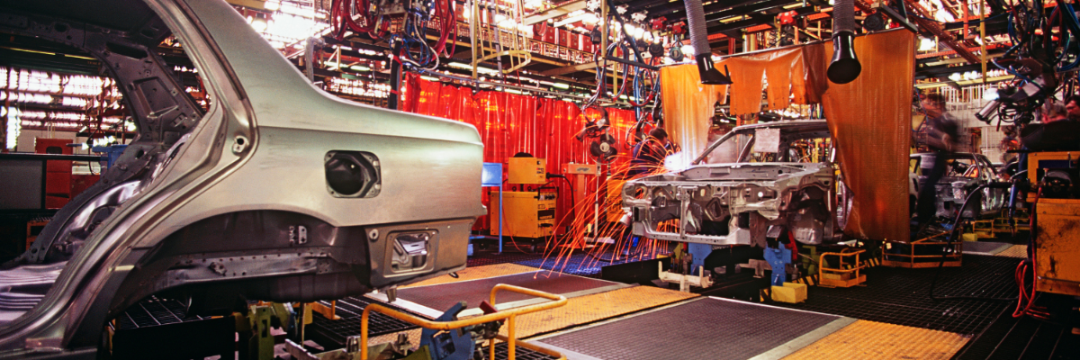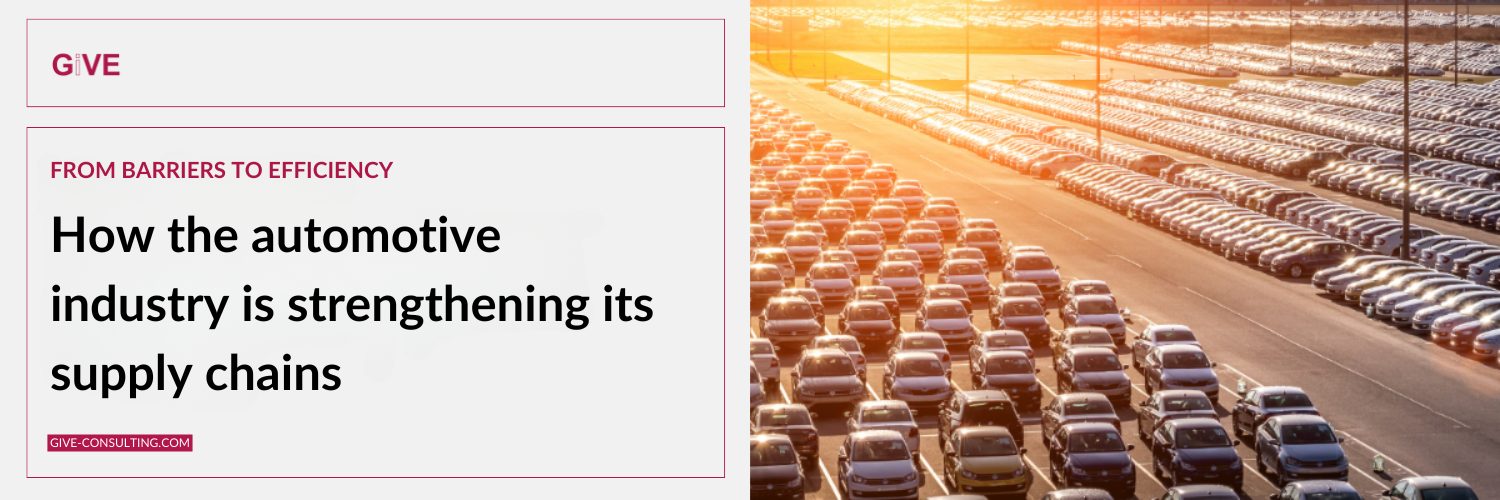Photo credit: PhotoMIX-Company für Pixabay (via Canva pro)
Automotive industry under pressure: strategies for more resilient supply chains
The automotive industry is one of the most complex sectors in the world and its supply chains place high demands on those involved.
In recent years, it has been confronted with significant challenges that have led to uncertainty and disruption in supply chains. This blog post examines the causes of uncertainties in the automotive industry's supply chains, the resulting challenges and possible solution strategies. It also looks at the importance of quality assurance and environmental protection in this context.
Why are supply chains insecure?
The term "Black Swan" describes an unexpected and unlikely future event with significant consequences. These events are so rare that they lie outside normal expectations and cannot be predicted by known facts.
The automotive industry's supply chains have increasingly fallen victim to these black swans in recent years. Examples of this are
- The COVID-19 pandemic: The COVID-19 pandemic has significantly impacted the automotive industry as lockdowns and supply chain disruptions led to shortages of raw materials and auto parts. The closure of the automotive industry in China at the beginning of the pandemic led to a shortage of up to 1.7 million car parts. The pandemic also led to disruptions in the supply chains for silicon, the material that chips are mainly made of. Manufacturers were either temporarily unable to work or transport to factories came to a standstill due to local lockdowns.
- The war in Ukraine: The war between Russia and Ukraine has led to additional bottlenecks and disruptions on the supply and demand side. Manufacturers and suppliers reacted by halting production and sales in Russia, and the war led to disruptions in the supply chains. Both countries are important suppliers of components for the European automotive industry, such as cable harnesses from Ukraine and palladium from Russia.
- Brexit: Brexit has changed trade relations between the UK and the EU and caused uncertainty in the automotive industry. The close cooperation that was previously based on the single market had to be reorganised and the uncertainty led to investment decisions being postponed. The tariffs and regulatory changes caused by Brexit have led to operational challenges and an increase in bureaucracy, complicating European supply chains and making them less attractive for international trade and investment relationships.
- Chip shortage: The chip shortage has significantly affected the automotive industry and led to production cutbacks at industry leaders. There are many reasons for this. On the one hand, the automotive industry has undergone structural changes, and both conventionally powered vehicles and electric cars require a large quantity of chips. Secondly, the pandemic has led to disruptions in the supply chains for chips, and natural disasters such as a drought in Taiwan and a cold snap in the USA have exacerbated the situation.

Photo credit: PhotoMIX-Company für Pixabay (via Canva pro)
Challenges in the supply chains
The above events have exposed existing problems and add to the many supply chain challenges facing the automotive industry:
- Lack of transparency in global supply chains: The automotive industry is inherently complex, with an average number of 30,000 components per vehicle, even a small blind spot can have a significant impact on the entire procurement process. This lack of transparency is exacerbated by the globalisation of supply chains, which often span multiple continents and involve a multitude of companies. A screw manufactured in East Asia, for example, passes through many assembly lines in other countries before it is finally installed in a car that ends up in a European dealership.
- Rising costs: The pandemic-related disruptions and rising energy prices have led to higher costs for manufacturers, making it more difficult to pursue long-term strategies and invest in more resilient supply chains.
- Environmental protection: Driven by ever stricter regulations and increasing customer demand, the industry is focussing on environmental protection and reducing emissions. Consumer demand for electric vehicles and stricter emissions regulations mean that green initiatives are essential for manufacturers and partners. This also applies to logistics partners.
Possible solutions for insecure supply chains
Several strategies can be considered to overcome the challenges and improve the stability of supply chains:
- Improved communication and collaboration: The use of software for real-time communication and the centralisation of all communication channels ensures a more efficient exchange of data between all parties involved. This strengthens relationships with suppliers and at the same time increases the robustness of the supply chain by recognising bottlenecks at an early stage.
- Supplier management: Maintaining relationships with suppliers based on openness, trust and communication is essential for a stable supply chain. This can be supported by the use of supplier management software to ensure smooth and efficient communication. Supplier management software can also help to make the supplier base more transparent to enable comparisons between suppliers and thus improve strategic planning.
- Resilience and flexibility: Supply chains need to become more resilient to unexpected challenges. This can be achieved by introducing processes for monitoring and warning of supply bottlenecks, simplified access to supply data and flexible, fast onboarding procedures.
- Electronic Data Interchange (EDI): The use of modern EDI solutions can overcome the complexity of global supply chains and improve the flexibility, transparency and planning capability of companies. EDI enables the direct and automated exchange of structured business information between the IT systems of business partners via standardised interfaces and formats. This can reduce the manual effort involved in processing incoming orders and increase efficiency. EDI-as-a-Service is an attractive solution, especially for small and medium-sized companies, as it is a more cost-effective alternative to traditional EDI. With EDI-as-a-Service, the system is provided and operated by the service provider, which reduces the need for in-depth expertise, installation and in-house operation. This enables companies to utilise the benefits of EDI without having to invest in expensive equipment.
- Reorganisation of supply chains: Dependence on specific suppliers or regions can be reduced by bringing new, compliant suppliers on board more quickly and flexibly. This can facilitate compliance and minimise the impact of disruption. Diversifying the supplier base can also help to increase supply chain resilience and reduce the risk of disruption. A study published by Capgemini in 2023 shows that sourcing from offshore locations in the automotive industry has decreased by 22% globally since 2021. At 27%, the decline is highest in Germany. A further global decline of 19% is expected by 2025.
- Technologies for more transparency: The introduction of technologies such as blockchain can improve the real-time tracking and traceability of goods in the supply chain. This increases transparency and enables better decision-making. By improving visibility, automotive manufacturers can better respond to disruptions and proactively take action to minimise the impact.

Photo credit: PhotoMIX-Company für Pixabay (via Canva pro)
Quality assurance and environmental protection in the automotive industry
Quality assurance (QA) and environmental protection are crucial aspects in the automotive industry that play an important role in securing supply chains and ensuring product quality.
Quality assurance
Quality assurance aims to create confidence in the fulfilment of product or service quality requirements. There are two main approaches: static and dynamic quality assurance. In static quality assurance, the quality parameters are specified externally and agreed by several contractual partners. External auditors carry out regular audits and communicate urgent measures. Dynamic quality assurance, on the other hand, focuses on the independent development of the organisation without external specifications.
In the automotive industry, quality assurance is essential to ensure fault-free components in production and to identify and eliminate the causes of faults. Some third-party providers have specialised in supply chain quality assurance services. EuroQ, for example, offers technical quality services to help OEMs and suppliers in the automotive industry. These include inspection services for incoming and outgoing goods as well as repackaging and relabelling services. In addition, companies such as Optimas, which specialise in fasteners and C-class products, can play a crucial role in streamlining supply chains. By standardising fastener components, the manufacture of vehicles and their components can be simplified, resulting in time and cost savings. Optimas also offers Vendor Managed Inventory (VMI) services. By taking over the management of inventory for customers, they contribute to an efficient and cost-effective supply chain.
Environmental protection
Environmental protection is becoming increasingly important in the automotive industry. Manufacturers must comply with stricter emissions regulations and take into account consumer demand for electric vehicles. This requires collaboration with new suppliers specialising in electric vehicles and the implementation of initiatives to reduce emissions.
Automotive manufacturers are faced with various challenges in this context. For example, circular economy initiatives are being delayed due to a lack of suppliers of (recycled) materials. In addition, sustainability and circular economy efforts need to be reconciled with factors such as cost and affordability.

Photo credit: PhotoMIX-Company für Pixabay (via Canva pro)
Conclusion
Securing supply chains in the automotive industry requires a combination of improved communication and collaboration processes, resilient and flexible systems, the effective use of technological solutions and a strong focus on quality assurance and environmental protection. By implementing these strategies, manufacturers can minimise the impact of disruption and build more resilient and productive supply chains.





